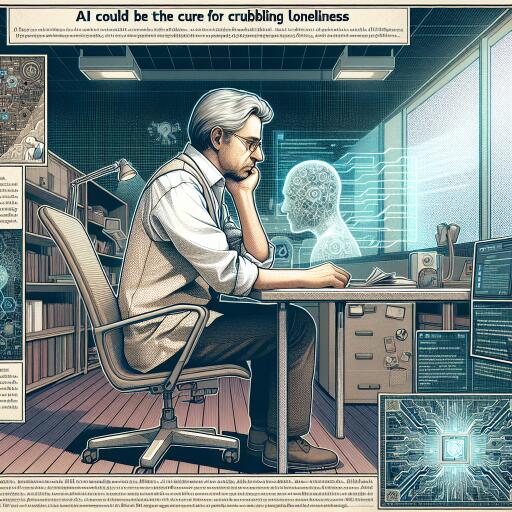Exploring AI’s Role in Combatting the Loneliness Epidemic
In a world where isolation and loneliness are increasingly becoming prevalent, the potential of artificial intelligence (AI) to serve as a remedy has sparked a fascinating debate among academics and technologists alike. Tony Prescott, a cognitive robotics professor at the University of Sheffield, has shed light on how AI might play a crucial role in alleviating loneliness, offering insights that resonate with current societal needs.
Loneliness is not just a fleeting feeling; it’s a condition that has been escalating, notably in countries like the UK and the US. In the UK alone, an estimated 7% of the population suffers from chronic loneliness, impacting nearly four million individuals. Across the pond, a 2021 Harvard University survey highlighted that a staggering 37% of Americans could be classified as “seriously lonely.” This epidemic of solitude disproportionately affects certain demographics, including young people and mothers with young children, pinpointing a widespread yet often overlooked crisis.
The implications of loneliness extend far beyond an emotional toll; it harbors significant health risks, including an elevated risk of premature death, cardiovascular issues, Alzheimer’s disease, and various mental health conditions. The urgency to address the loneliness epidemic is clear, with figures such as the US Surgeon General, Dr. Vivek Murthy, declaring loneliness a public health threat on par with smoking and obesity.
Amid these concerns, the concept of AI companions emerges as a beacon of hope for some. Prescott envisions a future where AI can offer engaging and custom-fit social interactions, potentially mitigating feelings of isolation. The allure of AI companions lies in their ability to provide consistent, reliable interaction, potentially reinforcing self-worth and maintaining, if not enhancing, social skills. This, in theory, could pave the way for more profound connections with both artificial and human companions.
However, this notion is not without its skeptics. Critics argue that reliance on AI for social interaction could lead to a decline in genuine human connections. MIT’s Sherry Turkle and Brunel University’s Christina Victor are among those raising concerns, suggesting a potential devaluation of deep, meaningful relationships in favor of superficial connections with machines. Moreover, the risk of dependency on AI for companionship cannot be overlooked, raising ethical and regulatory questions.
Despite these concerns, the landscape of AI in addressing loneliness is evolving, with advancements in technology enabling chatbots and virtual companions to become more empathetic and contextually aware. Through sophisticated algorithms, these AI entities can mimic human-like conversations, recalling past interactions and personalizing engagements based on users’ interests and emotional states.
While the debate over AI’s role in combating loneliness continues, the dialogue opens up essential conversations about the nature of human connection in the digital age. As technology advances, the balance between benefiting from AI companionship and nurturing human relationships will be paramount. With millions around the globe grappling with loneliness, the exploration of AI as a part of the solution—albeit with caution and regulation—reflects a crucial step toward understanding and addressing this modern-day epidemic.
As the discourse on AI and loneliness unfolds, it’s clear that the journey towards finding sustainable, meaningful solutions to loneliness is complex and multifaceted. Whether AI can truly cure loneliness remains to be seen, but its potential to provide relief and companionship to those in need is undeniably worth exploring.










